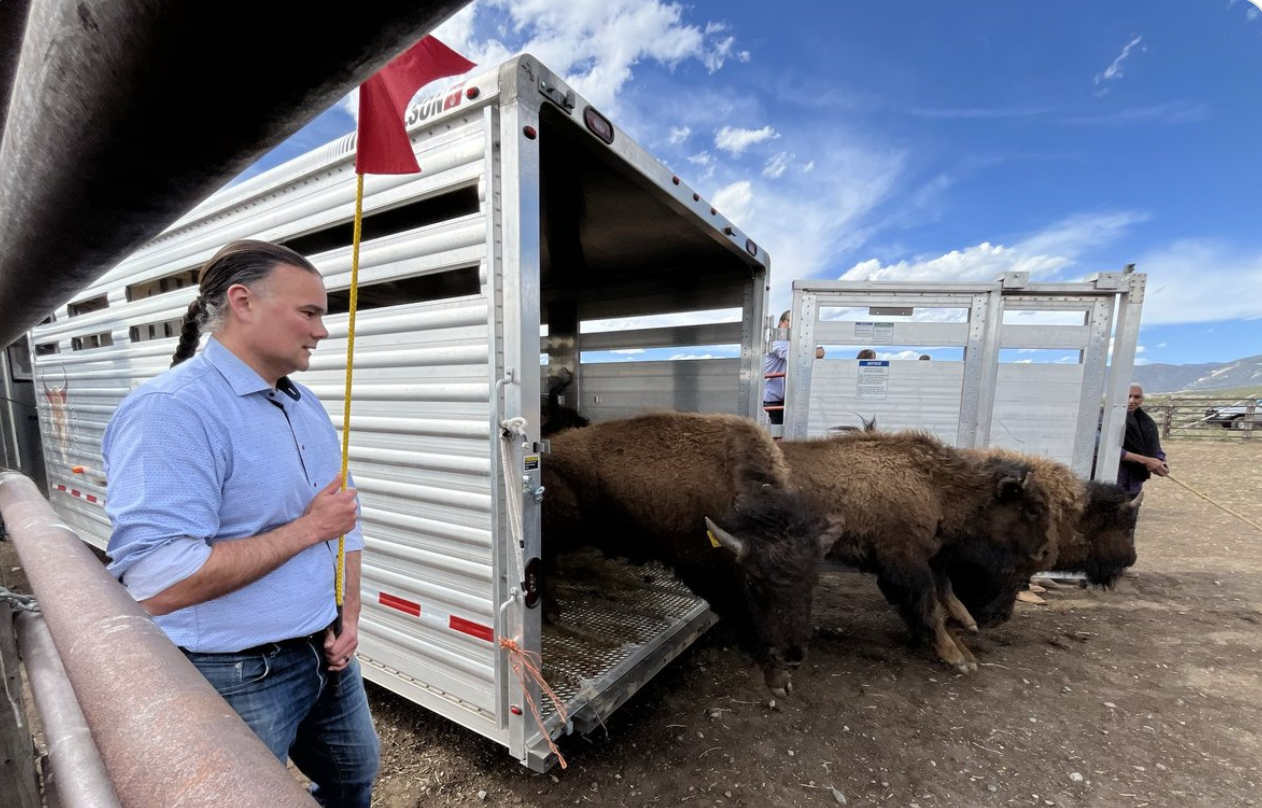
- Details
- By Native News Online Staff
Ten bison from Yellowstone National Park were released into the existing herd of buffalo on the tribal lands of the Taos Pueblo in New Mexico on Wednesday. On hand for the release was Assistant Secretary for Indian Affairs Bryan Newland (Bay Mills Indian Community).
Newland highlighted the significant funding the Interior Department has invested through President Joe Biden’s Investing in America Agenda to support the restoration of bison populations. In addition to the bison restoration, Newland highlighted the importance of grassland ecosystems in tribal communities.
In order to ensure grassland ecosystems, the Taos Pueblo is reestablishing native grasses through vegetation treatments that reduce the overgrown sagebrush canopy, helping to minimize nutrient and moisture competition. The new additions will add important genetic diversity to the Tribe’s existing herd of 100 bison.
The transfer was facilitated by the InterTribal Buffalo Council, which received $3.5 million to support its herd development and apprenticeship program created by Secretary’s Order 3410. The Council is a collection of 80 Tribes in 20 states that facilitates the management of more than 20,000 buffalo.
These activities advance the Department’s Grasslands Keystone Initiative, part of a restoration and resilience framework that is guiding $2 billion in investments from the Bipartisan Infrastructure Law and Inflation Reduction Act to restore lands and waters and advance climate resilience.
The Department currently manages 11,000 bison in herds across 4.6 million acres of U.S. public lands in 12 states. Last year, Secretary Haaland signed S.O. 3410, which is enhancing the Department’s work to restore wild and healthy populations of American bison and the prairie grassland ecosystem through collaboration among Department bureaus and partners such as other federal agencies, states, Tribes and landowners using the best available science and Indigenous Knowledge.
American bison once numbered 60 million in North America, with the population anchored in what is now the central United States. Many Indigenous cultures, especially in areas where the species was most abundant, developed strong ties with bison and relied upon them for sustenance, shelter, and cultural and religious practices.
More Stories Like This
Tribes, National Congress of American Indians Oppose Montana's TikTok Ban on Grounds of SovereigntyA Notable Victory for Justice in Case of Murdered Pit River Tribal Citizen
Call for Entire Ninth Circuit Rehearing of Apache Stronghold to Vindicate Tribal Nations’ Land-based Religious Practices
Photos of the Haliwa-Saponi Indian Tribe’s Powwow
Native Perspective. Native Voices. Native News.
We launched Native News Online because the mainstream media often overlooks news that is important is Native people. We believe that everyone in Indian Country deserves equal access to news and commentary pertaining to them, their relatives and their communities. That's why the story you’ve just finished was free — and we want to keep it that way, for all readers. We hope you'll consider making a donation to support our efforts so that we can continue publishing more stories that make a difference to Native people, whether they live on or off the reservation. Your donation will help us keep producing quality journalism and elevating Indigenous voices. Any contribution of any amount — big or small — gives us a better, stronger future and allows us to remain a force for change. Donate to Native News Online today and support independent Indigenous-centered journalism. Thank you.

